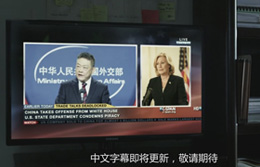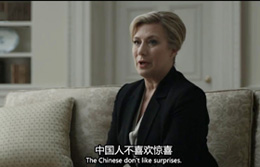|
 |
 |
|
REALPOLITIk: China factors heavily in the show's second season (SCREEN CAPTURED FROMHOUSE OF CARDS) |
Youth appeal
Intelligent, dapper and charming yet also utterly ruthless and, at times, sociopathic, the fictional Majority Whip of the U.S. Congress may seem somewhat a strange candidate for such widespread adoration. To explore this, Beijing Review contacted some Chinese viewers and asked them what exactly about the show appealed to them.
Like many people her age, Wang Yu, a 27-year-old customs officer in Shanghai, was introduced to the show by her friends and soon became an avid follower of the series. "I've watched both series and even viewed the first season three or four times while I wait for the next," she said.
Wang says that the show is very popular among her cohort. "I think that Chinese people of my generation grew up in the age of opening up and diplomacy so we have a lot of curiosity about other countries. I studied American and English literature in university and I am interested in politics generally, so naturally I am very curious about America and how its political system works," she said.
Shang Xi, a follower of the show in Beijing, said House of Cards is the first American TV show with a political context she has watched, adding that she was surprised by how gripping it is. "I've learned a lot about how the U.S. government works and the function of each department." She also elaborated on what sets the show apart from its Chinese counterparts, saying that political shows in China seldom cast leading characters in a negative or deceptive role.
Wang visited America in 2012 and in addition to Washington, D.C., made stops at New York, Las Vegas and Miami, the settings of shows in the CSI franchise, of which she is also a fan. Now, having seen House of Cards, she is eager to revisit the American capital. "I would like to go to Washington, D.C. again with a fresh perspective. I think I would have a new appreciation of the city," she said.
All the world's a stage
In spite of its modern trappings and contemporary setting, House of Cards is at its core a Shakespearian tragedy with Frank Underwood the latest in a line of villain protagonists that stretch back to Richard III and Macbeth.
Like its earlier UK counterpart, the show also employs the highly theatrical device of "breaking the fourth wall." At critical junctures in the story, Underwood turns to the camera and addresses the audience directly, often explaining the reasoning behind his actions or the lessons that can be inferred from various situations. For Shang, the show's overall message is clear. "Hunt or be hunted —I think it's universal in the political and business world," she said.
Despite his villainous nature, Wang has a very balanced take on the character. "He is realistic and pragmatic and has his own view in life. He does some questionable things to achieve his goals but he also helps people and encourages reform." The show even has its very own Lady Macbeth figure in Frank's wife, Claire Underwood, whom Wang also professes admiration for. "She stands by her husband, and helps him to realize his strategies. She is a very strong woman."
The show's theatrical nature certainly makes sense in the context of its cast and creators. Its star, Academy Award-winning actor Spacey, has often forgone lucrative film roles for the opportunity to devote himself to theatrical projects and has acted as artistic director of the famous Old Vic theatre in London since 2003. The show's creator Beau Willimon is a playwright and has produced many works for the stage including Farragut North, which went to be adapted into the 2011 film The Ides of March, written and directed by George Clooney.
Though the show does present the allure of the darker side of human nature, it can be argued the message it presents is not entirely amoral. A study of other examples in the same genre is instructive. In line with their Greek antecedents, the protagonists of such tragedies are undermined by a fatal flaw or hubris. The central character's thirst for power generally results in grisly consequences for both their enemies and those close to them. Without wishing to spoil things for viewers of future seasons, these stories rarely, if ever, end well.
Email us at: liuyunyun@bjreview.com | 